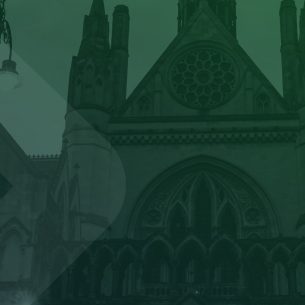Partner Maria Theodoulou explains why companies should not ignore the possibility of UK suppliers as a modern slavery risk.
Maria’s article was published in The Barrister, 02 September 2019, and can be found here.
The Global Slavery Index estimates that there are over 40 million people in slavery around the world. In 2017, footage emerged of slave auctions being held in Libya – something we had hoped was confined to the history books. Sadly, the problem of modern slavery and people trafficking has grown dramatically in recent years.
The United Nations defines human trafficking as the recruitment, transportation, transfer, harbouring, or receipt of persons by improper means (such as force, abduction, fraud, or coercion) for an improper purpose, including forced labour or sexual exploitation.
The UK’s Modern Slavery Act 2015 (the “Act”), requires larger businesses to examine their supply chains, and publish an annual Modern Slavery Statement, detailing the steps taken to prevent modern slavery in their business and supply chains. This requirement, set out at section 54 of the Act, only applies to companies with a global turnover of above £36 million which carry on business in the UK.
However, many such larger companies now require their smaller suppliers to provide information as regards their supply chains in turn. In this way, the Act is having a broad impact. In today’s globalised economy, many companies source materials, components and products overseas. These often come from countries with poor standards in terms of worker’s rights, where there is little transparency. It can therefore be a real challenge for companies to find reliable information about their supply chains.
Companies should work with their suppliers and take a genuine approach to partnership, for example making it clear that suppliers understand that they will not be dropped if forced labour is identified at their sites, but rather that the company will work with them to build their skills in identifying and addressing forced labour. Companies should take the necessary steps to engage with suppliers when required and should try and offer incentives or collaborate with other suppliers in order to work together to influence change.
The Act broadly defines modern slavery as encompassing slavery, servitude and people trafficking. The Home Office has published statutory guidance under the Act, “Transparency in Supply Chains etc. A practical guide”. In this, the Home Office concedes that it is difficult to define modern slavery, explaining that, “There is a spectrum of abuse and it is not always clear at what point, for example, poor working practices and lack of health and safety awareness seep into instances of human trafficking, slavery or forced labour in a work environment. However, businesses have a responsibility to ensure that workers are not being exploited, that they are safe and that relevant employment (include wage and work hour), health and safety, human rights laws and international standards are adhered to, including freedom of movement and communications.”
Therefore, companies need to take a broad approach when considering the possibility of modern slavery in their supply chains. The Home Office’s guidance also states that a Modern Slavery Statement should aim to include information about:
“the organisation’s structure, its business and its supply chains;
its policies in relation to slavery and human trafficking;
its due diligence processes in relation to slavery and human trafficking in its business and supply chains;
the parts of its business and supply chains where there is a risk of slavery and human trafficking taking place, and the steps it has taken to assess and manage that risk;
its effectiveness in ensuring that slavery and human trafficking is not taking place in its business or supply chains, measured against such performance indicators as it considers appropriate;
the training and capacity building about slavery and human trafficking available to its staff.”
Importantly, the guidance says, “The organisation should paint a detailed picture of all the steps it has taken to address and remedy modern slavery, and the effectiveness of all such steps.” This implies that companies should annually monitor the effectiveness of the steps taken in previous years.
Key steps clearly involve having robust anti-modern slavery policies and also carrying out detailed due diligence on suppliers. The charity Anti-Slavery International recommends that companies ask their overseas suppliers very specific probing questions, including:
- “Do workers feel free to refuse overtime?
- Did migrant workers pay a fee to get a job outside their hometown or country? What are the terms of repayment?
- Do workers retain complete control over their personal documents or have free access to them, if they are kept by their employer?
- Are workers paid on time, directly and in legal tender? Do they have payslips that accurately detail the hours they have worked and the rates which they are paid?
- Do you know who the workers are when you or your suppliers subcontract work? Are you aware of all subcontracting in your supply chain?
- Is prison labour used in the production of your goods?”
Companies should also ask questions about the participation of children in suppliers’ workforces. Specific requirements to prevent modern slavery, together with penalty clauses, and reporting requirements, can also be built into supplier contracts.
The guidance states that the statement must be written in plain English and linked to from the company’s homepage. The Home Office says that “it is vital that the statement can be easily accessible by anyone who wants to see it – the public, consumers, employees, NGOs or investors.”
The statement must be approved and signed by a senior person in the business. This ensures senior level accountability.
The Modern Slavery statement must be published on the companies’ website with a link to it on a prominent place on the homepage. If the company does not have a website, a written copy of the statement must be provided within 30 days of a request.
Under the Act, the UK government may take a High Court injunction to require a company to publish a modern slavery statement if it failed to do so. This will mean that the Company is subject to a court order to produce the statement.
A High Court injunction is not a financial penalty, but a company may be liable for the costs of the injunction in addition to the cost of future compliance. Of course the wider consequences of a breach will almost certainly include negative publicity.
The Home Office is quite open about the fact that it sees the court of public opinion as the primary enforcer of modern slavery requirements.
Using the force of public opinion to bring about change is perhaps an effective approach, since the UK cannot regulate matters outside its jurisdiction. Modern Slavery Statements focus minds and, by highlighting working conditions in overseas supply chains, can influence companies’ behaviour.
The court of public opinion can bring about real change. For example, Apple significantly stepped up its oversight of overseas suppliers in the wake of criticism of working conditions at Apple’s Chinese supplier Foxconn. Apple now implements measures including a strict “no passport withholding” policy for overseas suppliers, and pays for training to ensure overseas supplier staff are aware of their rights. Such measures saw Apple win the Thomson Reuters Foundation “Stop Slavery Award” in 2018.
While much of the media focus has been on overseas suppliers, companies should not ignore the possibility of UK suppliers as a modern slavery risk. Thousands of workers have been trafficked into the UK and many work in dire conditions for little or no pay. As the workers are illegal immigrants and often speak little English, they feel unable to turn to the authorities, and become victim to exploitation. The UK’s National Crime Agency believes modern slavery is increasing in the UK. It is thought that there are approximately 13,000 known cases of people living under modern slavery conditions here in the UK that we are aware of, which of course means the real figure is much higher. The Human Trafficking Foundation are working with the Metropolitan Police and local authorities to help detect where it is taking place, which they have found is often in homes and local businesses.
Any form of modern slavery should be dealt with appropriately and relevant remedies
should be made available to potential victims. The Organisation for Economic Co-operation and Development (OECD) has produced detailed guidance for Multi-National Enterprises (MNEs) on responsible business conduct. They provide principles and standards for responsible business conduct in areas of employment and industrial relations along with human rights which may help businesses when seeking to respond to or prevent modern slavery.
Rather than dismissing Modern Slavery Statements as yet another unnecessary regulatory requirement, companies can instead embrace them as an opportunity to consider the broader impact of their business practices in our increasingly interconnected global economy. Even if a business has an annual turnover below £36 million it should still consider producing a Modern Slavery Statement.





